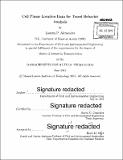Cell phone location data for travel behavior analysis
Author(s)
Alexander, Lauren P
DownloadFull printable version (12.14Mb)
Other Contributors
Massachusetts Institute of Technology. Department of Civil and Environmental Engineering.
Advisor
Marta C. González.
Terms of use
Metadata
Show full item recordAbstract
Mobile phone technology generates vast amounts of data at low costs all over the world. This rich data provides digital traces when and where individuals travel, improving our ability to understand, model, and predict human mobility. Especially in this era of rapid urbanization, mobile phone data presents exciting new opportunities to plan transportation infrastructure and services that meet the mobility needs and challenges associated with increasing travel demand. But to realize these benefits, methods must be developed to utilize and integrate this data into existing urban and transportation modeling frameworks. In this thesis, we draw on techniques from the transportation engineering and urban computing communities to estimate travel demand and infrastructure usage. The methods we present utilize call detail records (CDRs) from mobile phones in conjunction with geospatial data, census records, and surveys, to generate representative origin-destination matrices, route trips through road networks, and evaluate traffic congestion. Moreover, we implement these algorithms in a flexible, modular, and computationally efficient software system. This platform provides an end-to-end solution that integrates raw, massive data to generate estimates of travel demand and infrastructure performance in any city, and produces interactive visualizations to effectively communicate these results. Finally, we demonstrate an application of these data and methods to evaluate the impact of ride-sharing on urban traffic. Using these approaches, we generate travel demand estimates analogous to many of the outputs of conventional travel demand models, demonstrating the potential of mobile phone data as a low cost option for transportation planning. We hope this work will serve as unified and comprehensive guide to integrating new big data resources into transportation modeling practices.
Description
Thesis: S.M. in Transportation, Massachusetts Institute of Technology, Department of Civil and Environmental Engineering, 2015. Cataloged from PDF version of thesis. Includes bibliographical references (pages 111-118).
Date issued
2015Department
Massachusetts Institute of Technology. Department of Civil and Environmental EngineeringPublisher
Massachusetts Institute of Technology
Keywords
Civil and Environmental Engineering.